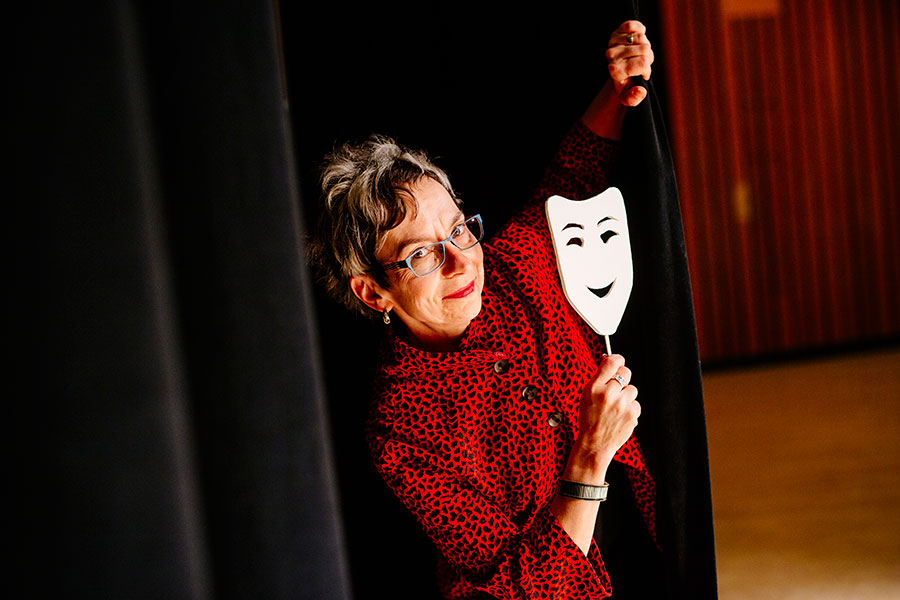Arts-based solution to workplace harassment
In health care, where the welfare of the patient comes before everything, it can be easy to overlook the mental wellbeing of those who provide care.
By University Communications Not so for one team of Saskatchewan researchers who have identified a growing problem of workplace harassment in the province's health care facilities and are testing an unorthodox method of addressing the problem.
Not so for one team of Saskatchewan researchers who have identified a growing problem of workplace harassment in the province's health care facilities and are testing an unorthodox method of addressing the problem.Elizabeth Quinlan, a sociologist at the University of Saskatchewan and a member of the research group, explained that workplace harassment—repeated aggressive behaviour or bullying among co-workers—is especially common in health care, where staff shortages and the high-stakes nature of the work drive up stress levels. To an already-burdened health system, the effects are measurable: increased staff turnover, health benefits costs and absenteeism.
But what first struck Quinlan was the personal anguish harassment caused among the health care aides she met, and the inevitable impact it had on their work.
"There's a direct relationship—and it only makes sense that there would be," she said. "The health of the caregiver has an effect on the health of the cared for."
Quinlan, who had been exploring uses of the arts for addressing health care issues, knew from previous research in the field that workplace interventions involving high levels of active participation by workers are most effective. She wondered if an arts-based intervention might be an ideal approach; why not invite caregivers to participate in theatre workshops that address the problem of harassment head on?
In a pilot study, she saw great results from bringing participatory theatre workshops to health care aides in several Saskatchewan long-term care homes. Now, equipped with nearly $200,000 in funding from the Canadian Institutes of Health Research, she is leading a new project that expands that study's scope to include aides, registered nurses and licensed practical nurses in both care homes and hospitals.
Quinlan, U of S law scholar Beth Bilson, U of S management and marketing professor Isobel Findlay, and University of Regina nursing professor Ann-Marie Urban will conduct the study.
A participatory theatre workshop unfolds like this. Participants are guided to create and perform a brief scenario that captures the essence of workplace harassment as they experienced it. A typical scenario might depict a group of aides shunning a new staff member at the lunch table, or a supervisor maneuvering to assign an unpopular co-worker all of the worst shifts.
The details are up to the participants; what matters, said Quinlan, is the "emotional authenticity" of the resulting theatrical performance. "We continue to refine that scenario so that everybody in the room can look at it and recognize their own experience in it."
When the target of the harassment—the protagonist of the scene—has reached the moment of greatest crisis, the action freezes. Now the participants propose solutions to the protagonist's dilemma, and to do so they must take her place in the scene and test their ideas in the live arena of the performance.
The protagonist might gain understanding into the bully's motivations or try to enlist the help of a neutral co-worker. As the scene evolves through improvised interactions among the performers, the group collectively identifies the most promising solutions.
"They might be successful in neutralizing the harassment, or they might not be. Either way, the entire group—those on the stage and those observing—gains insight into why some solutions work and others don't," said Quinlan.
Over the next three years, Quinlan and her collaborators on the new study will hold two-day workshops with each of the three employee groups, followed by rigorous evaluations of the results.
To extend the project's benefits, a video based on the workshops will be shared with the wider caregiving community. More importantly, Quinlan hopes the study's results will demonstrate the potential of participatory theatre for addressing workplace harassment in the world of health care and beyond.
As the team builds on its past success, participatory theatre will become another tool to help the frontline workers who deal with the problem of harassment each day.
"What we're looking for is a workplace cultural change that comes from the bottom up."
For more information about the participatory theatre project, visit at www.whichsk.com or contact which.sk@usask.ca
Written by Chris Putnam, communications officer in the College of Arts and Science.

